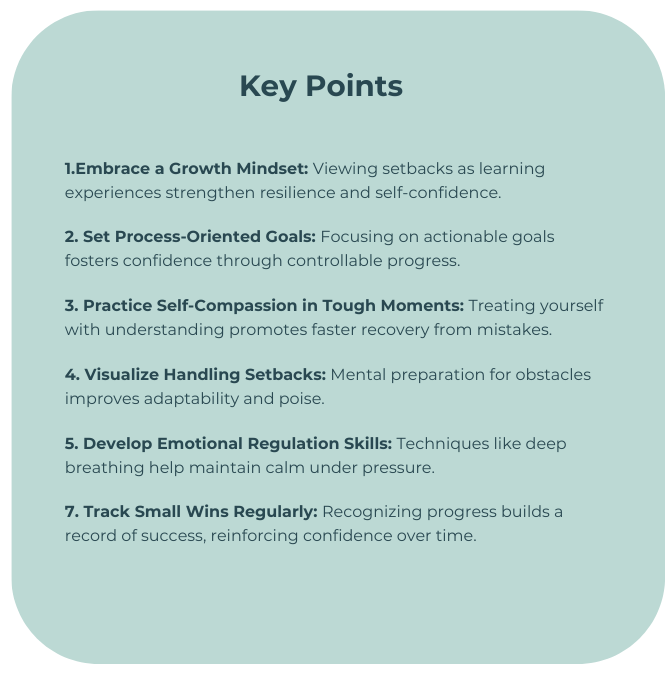The Zone of Resilience: Cultivating Robust Confidence for Consistent Performance in Sports
What to consider when reading:
How can athletes use resilience to strengthen their confidence after a setback?
Why is emotional regulation important for athletes, and how can it improve performance?
What are examples of process-oriented goals that athletes might set?
Every athlete knows the thrill of being “in the zone”—that state of peak performance where everything seems to flow effortlessly. But while getting into the zone is often seen as a matter of timing and skill, what if there was a way to stay in this zone consistently, even in the face of setbacks? This is the “zone of resilience”—a mental state where confidence stays strong and performance remains steady no matter what comes your way. It’s the mindset that helps athletes handle pressure, stay motivated, and perform with consistency.
In this blog, we’ll explore what the zone of resilience looks like in sports and break down the mental strategies you can use to cultivate robust confidence, stay focused, and maintain peak performance, even when the going gets tough.
Understanding the Zone of Resilience in Sports
The zone of resilience is a mental state that combines confidence with adaptability. Athletes in this zone don’t just have the confidence to perform—they have the mental resilience to handle setbacks, adapt to changing conditions, and maintain their performance under pressure. This state of resilience doesn’t eliminate challenges; it equips you to face them head-on without letting them undermine your confidence.
Resilience in sports is about developing a mindset that helps you bounce back from failure, stay composed under pressure, and trust in your abilities, even when things aren’t going your way. Building resilience-based confidence allows you to stay in control, push through challenges, and reach new heights in your performance.
Why Resilience-Based Confidence Matters for Athletes
Confidence is crucial in sports, but it needs to be built on a foundation that can withstand challenges. Resilience-based confidence is more than just self-belief—it’s an adaptive, stable form of confidence that helps athletes perform consistently, recover from mistakes, and stay focused on their goals. Here’s why it matters:
Improved Focus Under Pressure: With resilience-based confidence, you’re less likely to get distracted by setbacks or mistakes. This helps you stay focused, grounded, and ready to perform, regardless of external pressure.
Quicker Recovery from Mistakes: Athletes with resilience don’t let mistakes throw them off. They’re able to reset quickly and keep their focus on the game, instead of dwelling on past errors.
Increased Motivation and Perseverance: When you’re confident in your ability to overcome challenges, you’re more motivated to push through difficult training sessions and tough competition.
Greater Adaptability to Changing Conditions: Resilient athletes can adjust their approach mid-game, adapt to unexpected changes, and stay effective without losing their sense of control.
Building Robust Confidence for Consistent Performance
1. Embrace a Growth Mindset to Develop Resilience
Athletes with a growth mindset see every challenge as a learning opportunity, which strengthens their resilience. A growth mindset encourages you to view obstacles as steps toward improvement, rather than signs of failure.
Practice Tip:
After each game or practice, ask yourself, “What did I learn today?” Focus on lessons learned, not just the results. This approach helps you build confidence through growth, reinforcing the idea that improvement is ongoing.
2. Set Process-Oriented Goals
Setting process-oriented goals helps you stay focused on actions you can control, rather than just the outcomes. These goals allow you to measure progress based on effort and technique rather than wins and losses.
Practice Tip:
For each game, set one or two specific, actionable goals, like improving your speed or staying focused on defensive strategy. Measuring success by these goals helps you build confidence based on effort and improvement, creating a solid foundation of self-belief.
3. Practice Self-Compassion to Keep Perspective
It’s easy to be hard on yourself after a mistake, but self-compassion allows you to recover faster and maintain your confidence. Treating yourself with understanding helps you stay focused on growth instead of dwelling on errors.
Practice Tip:
After a tough game, take a moment to acknowledge your effort and consider how you’ll approach similar challenges in the future. This positive self-talk reinforces resilience and helps keep your confidence intact.
4. Visualize Handling Setbacks as Part of Preparation
Athletes often visualize successful outcomes, but imagining potential setbacks—and seeing yourself handle them successfully—can strengthen resilience. This type of visualization prepares you to manage stress and adapt quickly when things don’t go as planned.
Practice Tip:
Before your next game or competition, visualize both successful plays and possible setbacks, such as making a mistake or dealing with a strong opponent. Imagine yourself responding with calm and confidence. This mental rehearsal helps you stay steady and resilient during real challenges.
5. Build Emotional Regulation Skills to Stay Calm
Being able to manage your emotions is key to maintaining resilience under pressure. When you can stay calm, you’re able to make better decisions, keep your head in the game, and bounce back from setbacks quickly.
Practice Tip:
Use deep breathing techniques, like the “4-7-8” method: inhale for four counts, hold for seven, and exhale for eight. Practicing this regularly can help you stay composed under pressure, strengthening your ability to maintain resilience in high-stress moments.
6. Track Small Wins to Reinforce Confidence
Celebrating small wins keeps you motivated and reminds you of the progress you’re making. This constant reinforcement of success builds a mental “record” of achievement, which strengthens your confidence and resilience over time.
Practice Tip:
After each training session or game, write down one thing you did well or one small goal you achieved. Reviewing these accomplishments regularly can boost your confidence, reminding you of your progress and helping you stay resilient through challenges.
Staying in the Zone of Resilience
Resilience is not a “one and done” skill—it’s an ongoing practice that requires attention and effort. Here’s how you can stay in the zone of resilience consistently:
Reflect Regularly on Performance: Take time each week to reflect on both successes and challenges. By learning from each experience, you reinforce the resilience-based confidence that drives you forward.
Surround Yourself with Supportive People: Coaches, teammates, and mentors who encourage resilience can make all the difference. Having a positive, supportive network can keep you grounded and reinforce your confidence, even when things get tough.
Embrace Flexibility in Your Approach: The ability to adapt and pivot as circumstances change is a hallmark of resilience. By staying open to different approaches, you’ll find that challenges become more manageable and your confidence remains steady.
Final Thoughts
Building resilience-based confidence is essential for athletes who want to perform consistently at their best. By focusing on a growth mindset, setting process-oriented goals, practicing self-compassion, and visualizing resilience, you can cultivate a confidence that doesn’t waver under pressure. Staying in the zone of resilience will help you handle setbacks, adapt to challenges, and keep your confidence strong, giving you the mental edge you need to succeed in sports.
Embrace the journey of building resilience—it’s the foundation that will keep you steady, focused, and ready to perform at your best, no matter the circumstances.
Take the First Step Toward your Well-Being
At The Mental Game, we know that navigating life’s challenges requires more than just determination—it requires the right support and strategies tailored to your unique needs. Our team of seasoned professionals is dedicated to helping you build the mental resilience and skills necessary to excel, no matter what life throws your way.
Visit The Mental Game to learn more about our services and schedule your FREE consultation today and take the first step toward a healthier, more resilient mind.

